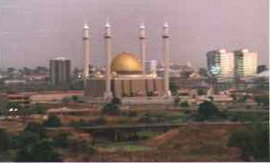
| 
|
 |
 NIGERIA
NIGERIA
A new business climate |

 Business - Economy - Lean and clean - Core issues - Home truth - Business - Economy - Lean and clean - Core issues - Home truth -
Oil business - Private sector - Banking 
 THE CORE ISSUES THE CORE ISSUES
While receiving a three-man delegation from the Citizens Power company of the United States led by its chairman, William E. James. Obasanjo advised all genuine businessmen to disregard any middleman or contact person who claims to have access to him or his ministers. He said a level-playing field has been created for all businessmen in the country. He told the delegation that for the first time in over 15 years, oil lifting contracts in the country were being given to qualified applicants who had not been introduced to the government by any sponsor. This he noted was an indication of the new business climate in the country.
James told Obasanjo that his company was investigating the electricity, gas and communications sectors of the nigerian economy.
The president told the managing director of Bouygues nigeria Limited who visited him that his government would accord priority to projects that could significantly contribute to poverty alleviation and boost employment levels in the country.

The government's hopes for job creation and poverty alleviation rests on creating a conductive environment for investment. This is more so as it recognizes the imperative of rationalizing the public sector. In the past government has sought cure for poverty and unemployment from such institutions as National Directorate of Employment, People's Bank, family economic advancement program, and so on. Their impact has been minimal and the government has now set up a panel to reappraisal past approaches and recommend better options.
Analysts urge the government to push for accelerated private sector-led growth and development, such that a rising tide lifts every boat. Resuming growth is of great concern to the government. Operators in the economy blame declining productivity on inadequacy of such infrastructure as power, transport and telecommunication.
Obasanjo says his strategy for infrastructure encompasses rehabilitation, resuscitation and revitalization. Rather than relying, as before, on monolithic public sector agencies, he is reaching out to domestic and foreign investors.
|
He uses every opportunity to drive home his point that in nigeria, it is no longer business as usual. His campaigns for repositioning nigeria appear to be yielding fruit as investors warm up to the country.
Sir Patrick Brown, vice chairman of Kuvaener Corporate Development (KCD) of the United Kingdom led a four-man delegation to the State House. Obasanjo told him that the era of gratification as a condition for contract awards was gone for good. That his administration would welcome any contractor who was prepared to do business, without indulging in the malpractices of the past.
He assured honest businessmen of access to the abundant opportunities in the country. Sir Brown praised the president for what he called the good business atmosphere being restored to the country and thanked him for the opportunity to participate in the regeneration of the country.
Private investors' interest in nigeria is further kindled by the favorable perception of the country in global diplomatic circles. Visiting French President, Jacques Chirac told his nigerian counterpart that at the last G7 summit, nigeria was included among countries that should have a considerable reduction in their debt.
Obasanjo told Chirac that his administration's anti-corruption campaign will provide a secured atmosphere for legitimate businesses to thrive. He promised security of investments as well as predictable fiscal and monetary policies.
A defense team from the United States visited the new speaker of the House of Representatives. The US Ambassador said the team came to reassure the government of the US commitment to greater economic and strategic relations with nigeria. The visiting IMF deputy managing director, Dr. Alasanne Quattara described nigeria as the locomotive of West Africa.
He told the senate president that there is a convergence of opinion among international donor agencies that it was necessary to support the country to sustain its new democracy. Mr. Quattarra said the IMF will help alleviate nigeria's debt problem and join in tackling the problem of poverty, unemployment and underdevelopment.
He adds: "Your country with about 100 million people should be doing better than this with proper exploitation and harnessing of resources." Chief Phillip Asiodu, Chief Economic Adviser to President Obasanjo said the visit of the IMF deputy managing director was a morale booster to the federal government's efforts at revamping the economy. The Senate President, Evan Enwerem, said: "nigeria will appreciate anything that the IMF can do to facilitate private investment in its economy". |
© World INvestment NEws, 1999.
This is the electronic edition of the special country report on nigeria published in FORBES Magazine,
October 18 th issue.
Developed by AgenciaE.Tv |
|
|
|
| |
| | | |
|

